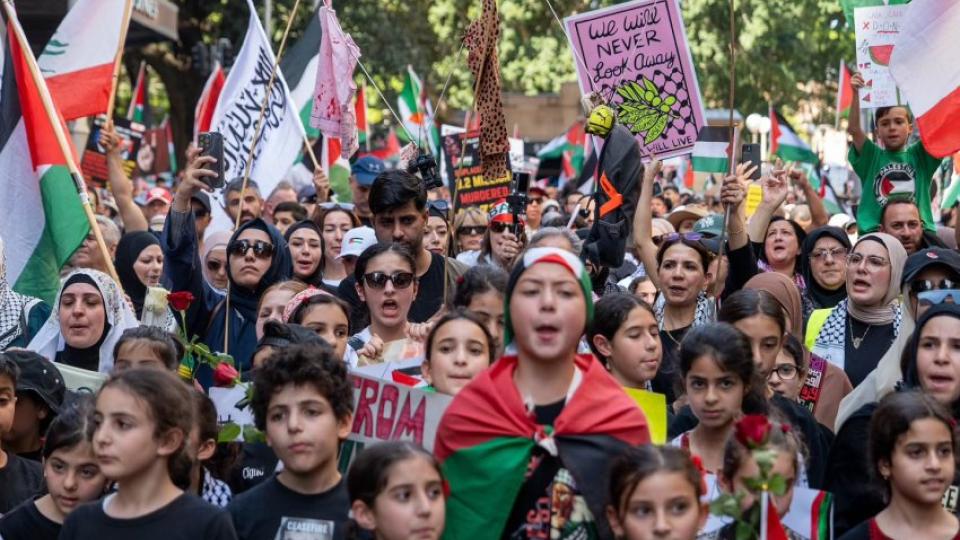Palestine: The more they try to silence us the louder we will be

As the apocalyptic violence unleashed upon Gaza grinds on, Anthony Albanese is confronted with an insoluble problem.
For the United States and its closest allies, support for Israel is non-negotiable. As former US Secretary of State Alexander Haig declared: “Israel is the largest American aircraft carrier in the world that cannot be sunk … and is located in a critical region for American national security.”
But a significant proportion of Australians are horrified by the genocide and want Labor to do what it can to stop it.
Labor’s usual tactic is soothing messages and performative actions as cover for business as usual.
This is Labor’s historic function: the “soft cop” to the Liberals “tough cop” on behalf of big business.
However, it does not work with genocide. Foreign minister Penny Wong has tried conditional endorsement of a ceasefire, support for a so-called two-state solution — even though the Benjamin Netanyahu government is not interested in either — and other impotent hand-wringing.
Fremantle Labor MP Josh Wilson has twice now told us, from parliament, how sad he feels about the destruction in Gaza. But he has not demanded his own government to do anything meaningful to pressure Israel to stop.
Words count for nothing when Labor aids genocide through its bilateral military ties, its suspension of funding to the United Nations Relief and Works Agency for Palestine Refugees (based on lies) and its refusal to impose diplomatic or trade sanctions.
As the street and campus protests have continued throughout the year, support for Labor has collapsed among Muslim and Arab communities.
Labor is now seeking to silence our voices.
It doesn’t have the social licence for overt repression and censorship, so it has resorted to the disingenuous claim that support for human rights in Palestine is mired in antisemitism.
Its deliberate misuse of the term, to deflect from its own complicity, actually makes it harder to fight antisemitism and will stain it forever.
However, in the short term, it is a green light to senior management in the corporate media, police, education, local government and the arts to squeeze out Palestinian voices and their supporters.
It also seeks to create a climate of self-censorship, to shut people up for fear their careers will be damaged and reputations smeared.
Examples of the offensive against free speech and racist devaluing of Palestinian lives are everywhere.
The ham-fisted tactics and mealy-mouthed explanations of those enforcing it are as absurd as they are offensive.
Condell Park High School in Sydney’s West banned a student of Palestinian background from wearing a keffiyeh, gifted by his sister, to his graduation ceremony. This is despite a tradition of encouraging students to wear items of cultural significance.
Would it have stopped a Jewish student from wearing a kippah, or a Sikh a turban? To even ask the question is to answer it.
In response, students pinned keffiyeh patterns to their bags and protested at the school gates.
The student demanded an apology. Instead, the school and NSW Department of Education doubled down, refusing entry to the school formal for students wearing a keffiyeh.
Equally disturbing is the Joint Committee on Human Rights’ inquiry into antisemitism on university campuses.
This comes after the Australian Senate Standing Committee on Legal and Constitutional Affairs egged on false claims of antisemitism, the appointment of a Special Envoy to Combat Antisemitism and a study into racism at universities by the Australian Human Rights Commission.
These stunts are a direct response to the surge in student activism across universities, and a dishonest attempt to smear it as antisemitic.
Much of the media repeated the claim that the encampments made Jewish students feel “unsafe”, while studiously ignoring the voices of anti-Zionist Jews.
Curtin University management sent an email to two students involved in that encampment, demanding they cease handing out fliers and remove the university’s name from their banners, due to it being private intellectual property.
The students went public. University management denied to the media it was an attack on free speech. In a comical twist, it deleted the email from its server.
More seriously, students across the country have been threatened with suspension or expulsion for their Palestine activism via confidential misconduct charges.
This has been accompanied by Zionist organisations pushing for more universities to adopt the International Holocaust Remembrance Alliance definition of antisemitism, which conflates criticism of Israel with antisemitism.
Adopting it undermines academic freedom and blocks serious discussion about the origins and practice of the Israeli state.
However, these attacks on free speech will not succeed. Everywhere, people are pushing back. With a genocide livestreamed to our screens, more will speak out.
The open letter by 113 prominent Fremantle artists, in late October, calling on Wilson to challenge his party’s position or resign from it shows the way.
The letter also called for Australia to withdraw its ambassador from Israel, expel Israel’s ambassador from Australia and to cut military and economic ties with the Zionist state.
The level of organisation and shift in consciousness in support of Palestine is unprecedented.
Australia’s decision this week to vote for rather than abstain on a United Nations resolution demanding Israel rapidly end its occupation of the Palestinian Territories shows the pressure is cutting through.
But we need to keep it up. The movement is spreading, but is still too small to force the changes we need.
The best way to resist the institutional assault on free speech and grow the movement is to speak out for Palestine and to do it now — anywhere and everywhere we can.
[Sam Wainwright is a national co-convenor of the Socialist Alliance.]